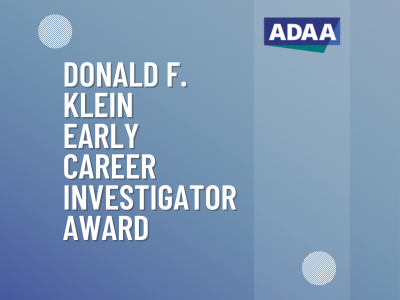Past and Present Winners of Donald F. Klein Award Discuss their Work, Recognition and the Importance of Collaboration
Past and Present Winners of Donald F. Klein Award Discuss their Work, Recognition and the Importance of Collaboration

In Conversation with Emily L. Belleau, PhD and Sage E. Hawn, PhD
Considered by many to be the “father of psychopharmacology,” Dr. Donald F. Klein (1928-2019) was a pioneer in the field of psychiatry. Dr. Klein’s research into depression, anxiety and other related disorders and his extensive studies of the use of drugs to treat panic attacks, phobias and addiction heralded in a new era of treatment and care. His work was not only groundbreaking but galvanized the understanding of mental health disorders in a more inclusive way. As a young researcher with a background in biochemistry and physiology, Dr. Klein revolutionized how mental health professionals incorporated biology, genetics and neuroscience into psychiatric and psychological practice.
In honor of Dr. Klein, ADAA each year recognizes the work of an early career investigator for the best original research paper on neurobiology, psychopharmacology, psychosocial treatment or experimental psychopathology of anxiety disorders and depression. A highlight of the annual conference is the presentation of the ADAA Donald F. Klein Award. This year at the 2023 Annual Conference, a clinical psychologist from McLean Hospital, Harvard Medical School, will be honored for her work researching neurobiological markers that might predict or be associated with risk for depression.
ADAA had the chance to chat with the 2023 winner, Emily L. Belleau, PhD, and the 2022 winner, Sage E. Hawn, PhD, about the award and what it means to each of them. Speaking together, the two clinicians were an impressive duo, each with her own set of skills, knowledge and study, working on separate but incredibly meaningful and valuable research. Both Dr. Hawn and Dr. Belleau expressed the importance of being recognized by ADAA for their work and the significance of their studies.
“It was a very good experience at the early career level because it facilitated so many networking opportunities for me,” Dr. Hawn said about the 2022 award. Her winning research involved studying a particular gene that influences inflammatory processes and how it relates to PTSD (post traumatic stress disorder) which is often associated with inflammation in the brain.
“I went to the conference (Denver2022) and as the awardee, I was invited to specific events and met so many colleagues. My contacts list was filled with fellow professionals and some of those relationships have turned into collaborations.”
As an advocate of the open science movement, Dr. Klein, who received the 2005 ADAA Lifetime Achievement Award, strongly supported the sharing of research, ideas and practice. It was something he implemented throughout his career and ADAA, with the Klein Award, honors that belief.
“ADAA has this very unique blend that brings together basic researchers, clinical researchers and clinicians in practice,” Dr. Belleau said about the annual conference where she will receive the 2023 award. “Having those diverse perspectives is so important for moving the science forward.”
Dr. Belleau, a former participant in ADAA’s Alies Muskin Career Development Leadership Program (CDLP), says the CDLP was a great experience and she continues to look for ways to engage in ADAA programs and events.
“When you’re at a time in your early career, gaining visibility in your research agenda is so important,” Dr. Belleau told ADAA, “and this award helps that in multiple ways: through this interview with ADAA, presenting at the conference, facilitating a webinar, and fostering connections with other researchers.”













